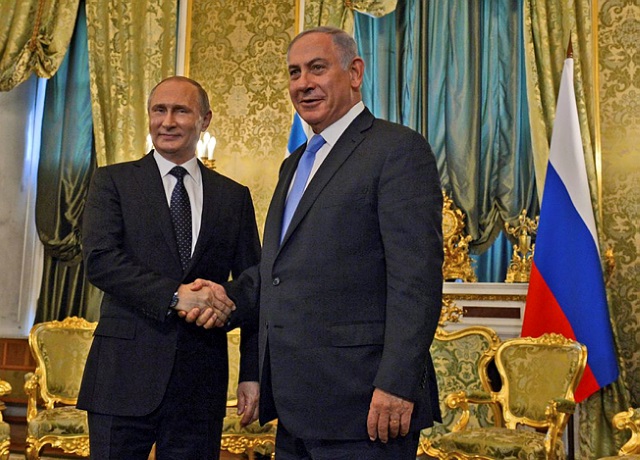Did Prime Minister Netanyahu walk away from a recent meeting with Russian President Vladimir Putin with any assurances related to Iranian aggression in Syria?
By: Steve Leibowitz, World Israel News
Few details have emerged from Prime Minister Netanyahu’s meeting on Monday with Russian President Vladimir Putin, and Israeli analysts are concerned that Netanyahu’s demands regarding the containment of Iran in Syria are not being taken seriously by the Russians.
Netanyahu said he told the Russian president about his concerns that “Iran is attempting to create military bases in Syria,” and to place “high-precision weapons” in Lebanon to target Israel. Netanyahu said he also told Putin that Israel will act on its own if the international community fails to handle the issue. Putin’s response was not made public.
Dr. Mordechai Kedar from the BESA Center told World Israel News (WIN), “One can hope that Putin is listening and taking Netanyahu’s comments and concerns seriously, but I doubt it. I am afraid Netanyahu is becoming a nuisance to Putin because his message now is the same message with which he came to several previous meetings.”
“Israel is worried about Hezbollah and Iran and Putin must be tired of hearing it. As far as Putin is concerned, he is focused on his interests in Syria which are keeping Assad in power and maintaining Russia’s naval base in Latakia on the Mediterranean coast. They don’t care about Iranian moves that do not threaten those interests. As far as Putin is concerned, Israel and Iran can posture or fight as much as they want as long as Russian interests are not threatened,” explained Kedar.
Is Putin sympathetic?
Russian affairs expert Dr. Stephanie Hoffman from the Hebrew University told WIN, “We can assume there was no disaster in the meeting. I think Putin actually understands Israel’s position on Iran and he is personally sympathetic. On the other hand, he has his own interests.”
Hoffman continued, “He meets the Israeli leader and he is nice to him but that will not prevent him from cooperating with Iran in Syria. Putin does allow Israel something of a free hand when it acts in Syria to prevent arms transfers to Hezbollah. He knows that Israel has a legitimate red line when it feels threatened and takes actions to defend [itself]. Israel agrees to operate quietly and the Russians agree not to object.”
Hoffman added, “Russia is also not against Iran being reigned in because they too have issues with the Iranian export of Islamic radicalism to Muslim countries like Chechnya that are in the Russian sphere.”
Syria: A platform for Iranian militancy
Netanyahu has voiced concerns that Syria could become a platform for Iranian-supported Shiite militancy aimed at Israel and many other places in the Middle East, Russia has boosted cooperation with Iran since the start of the Syria conflict in 2011. Russian aircraft have carried out airstrikes in support of Iran’s Revolutionary Guards and Syrian security forces.
Russian-Iranian ties extend beyond Syria. Moscow recently completed delivery of S-300 air-defense system to Iran last year, a sale that under U.S. and international pressure was suspended in 2010 and has been vigorously opposed by Israel.
There were signs of genuine friendship between the two leaders as Putin and Netanyahu met at the Jewish Museum and Tolerance Center in Moscow, where they also attended an event marking Holocaust Remembrance Day and the anniversary of the lifting of the Leningrad siege during the Second World War. The two leaders sat together viewing a presentation of the upcoming film “Sobibor” about the only successful uprising in a Nazi death camp and visited the Museum’s exhibition.
“This is a very tragic story,” Netanyahu said. “But this is a story about the stunning heroism.”
According to Dr. Hoffman, the attendance of Putin and Netanyahu at the Holocaust related events in Moscow were window dressing and “not very meaningful.”
Dr. Kedar described Putin’s hosting of Netanyahu at the Holocaust events as merely “games Putin plays to show that he is ‘a good person.’”


